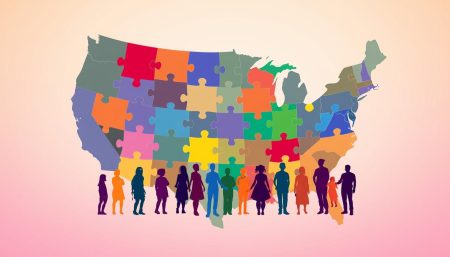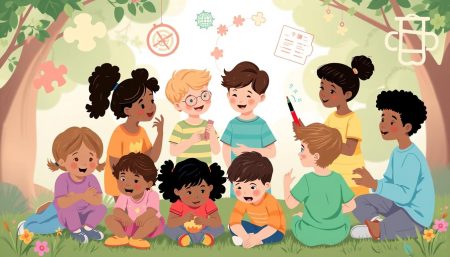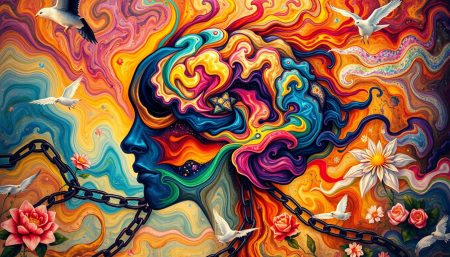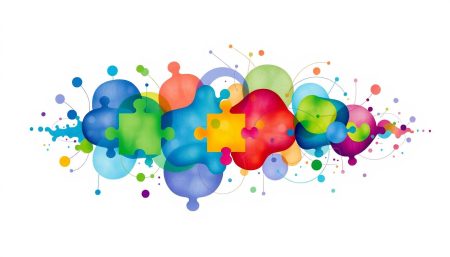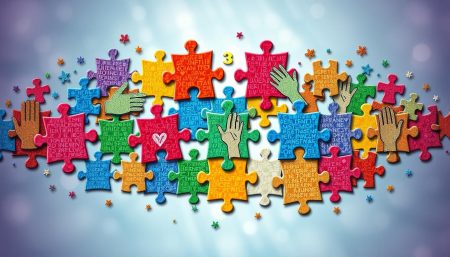Sheldon Cooper, the quirky genius from The Big Bang Theory, has sparked countless debates among fans. His unique personality and behavior have led many to wonder: Does Sheldon Cooper have autism spectrum disorder?
This beloved character, known for his brilliant mind and social awkwardness, displays many traits that align with autism spectrum disorder. From his rigid routines to his difficulty understanding sarcasm, Sheldon’s behaviors have fueled speculation about his neurodiversity.
In this analysis, we’ll dive deep into Sheldon Cooper’s traits. We’ll examine his social interactions, communication style, and unique quirks. We’ll explore how these characteristics compare to common signs of autism spectrum disorder, shedding light on this intriguing question.
Understanding Sheldon Cooper’s Character Background
Sheldon Cooper is a key character in The Big Bang Theory. He is known for his unique traits and behaviors related to neurodivergence. His background is key to understanding his personality in the series.
Early Life and Family History
Sheldon was born in East Texas. His family didn’t grasp his genius. His childhood, with a tough relationship with his dad and a close bond with his grandma, shaped his quirks and interests.
Academic and Professional Achievements
Sheldon’s intelligence led to great academic success. He got his first Ph.D. at 16 and became a respected physicist. His achievements show his exceptional mind, a common trait in neurodivergent individuals.
Role in The Big Bang Theory
In the show, Sheldon works at Caltech. His genius and social challenges lead to both funny and touching moments. His development offers insights into neurodivergent individuals in social and professional life.
| Aspect | Description | Impact on Character |
|---|---|---|
| Family Background | Conservative Texas upbringing | Contributes to social awkwardness |
| Education | Child prodigy, multiple Ph.D.s | Fuels ego and intellectual superiority |
| Career | Theoretical physicist at Caltech | Provides platform for showing genius |
Does Sheldon Cooper Have Autism: Analyzing the Evidence
Fans of The Big Bang Theory often wonder, “Does Sheldon Cooper have autism?” To answer this question, we need to examine his behavior closely. Sheldon shows many traits linked to autism spectrum disorder. But, it’s key to remember the show’s creators never officially said he had it.
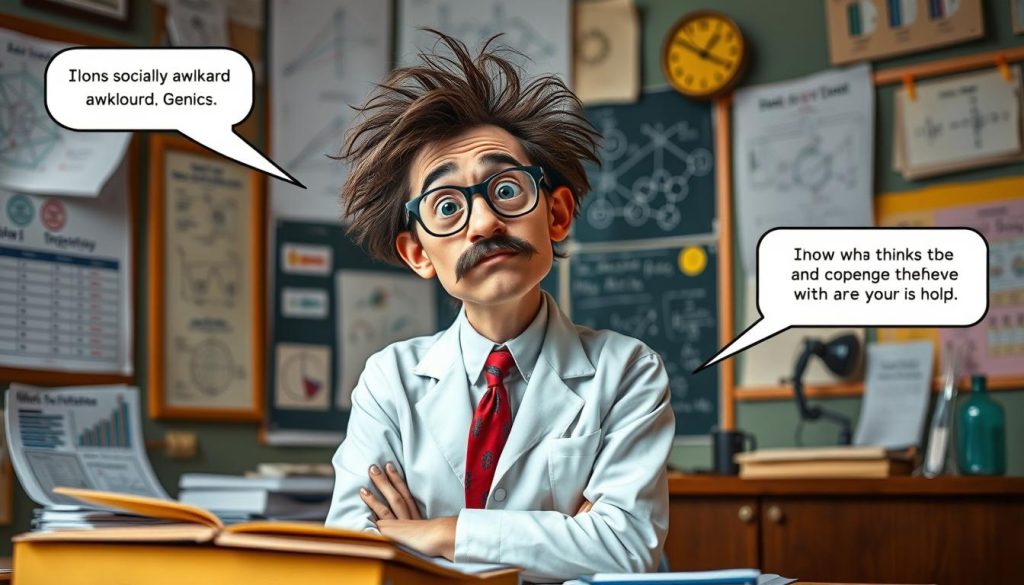
Sheldon’s social skills deficit is a big clue. He has trouble understanding sarcasm, reading social cues, and feeling empathy for others. These issues are common in autism spectrum disorder. His strict routines and deep focus on certain topics also match autism traits.
But Sheldon’s character is more than just quirks. His incredible intelligence and memory might explain some of his oddities. His upbringing in a conservative Texas home could have shaped his unique personality. It’s important to avoid guessing and remember Sheldon is a fictional character made for fun.
Even though the debate goes on, Sheldon’s character has helped raise awareness about neurodiversity. Whether or not he has autism, his portrayal has started important talks about social differences and acceptance in society.
Common Characteristics of Autism Spectrum Disorder
Autism spectrum disorder affects people in different ways. Knowing its main traits helps us see how it changes behavior and how people interact. Let’s look at the key features of this condition.
Social Communication Patterns
People with autism often find social situations hard. They might have trouble reading nonverbal signs or keeping up in talks. This can make it tough to make friends and follow social rules.
Behavioral Tendencies
Autism is also linked to repetitive actions and strict routines. These can include:
- Repeating certain movements or words
- Following schedules very closely
- Being very focused on specific interests
Sensory Sensitivities
Many with autism are more or less sensitive to sensory inputs. This can mean:
- Being very sensitive to loud sounds or bright lights
- Not liking certain textures or tastes
- Looking for specific sensory experiences
These sensitivities can really affect daily life. They can influence what clothes people wear, what they eat, and where they go. By knowing these traits, we can better support those with autism spectrum disorder.
Sheldon’s Social Interaction Patterns
Sheldon Cooper’s way of interacting with others is quite noticeable. His actions often show a lack of social skills, common in neurodivergent people. He finds it hard to engage in small talk, misses social signals, and keeps friendships short.
In social situations, Sheldon usually takes over conversations with his favorite topics. He goes on and on about physics or trains, even if others aren’t interested. This deep focus on specific subjects is a trait found in some autistic individuals.

Sheldon also has trouble understanding language. He takes sarcasm seriously and finds metaphors confusing. These issues with communication are common in those with social skills deficits.
| Social Interaction | Sheldon’s Behavior | Typical Neurodivergent Trait |
|---|---|---|
| Small Talk | Avoids or misunderstands | Difficulty with casual conversation |
| Sarcasm | Takes literally | Trouble interpreting non-literal language |
| Social Cues | Often misses or misinterprets | Challenges reading body language and facial expressions |
| Personal Space | Lacks awareness | Difficulty understanding social boundaries |
Despite his social challenges, Sheldon has deep connections with his friends. His unique views and honesty, even if blunt, enrich his relationships. This blend of social difficulties and true connections shows the complex side of neurodivergence in social interactions.
Rigid Routines and Ritualistic Behaviors
Sheldon Cooper’s strict habits are key to his character. These habits are similar to those found in autism spectrum disorder. Let’s look at some of Sheldon’s most notable routines and rituals.
Daily Schedule Adherence
Sheldon’s day is ruled by a strict schedule. He wakes up, eats, and works at exact times. His bathroom and laundry routines are also set. This strict schedule is a trait often seen in people with autism.
Spot on the Couch
Sheldon always sits in his favorite spot on the couch. He believes it’s the center of the universe. This shows his attachment to a specific place, a common trait in autism.
Meal Planning and Food Preferences
Sheldon’s eating is also very structured. He has meals for each day and specific restaurants for different times. His dislike for certain foods and textures also shows sensory sensitivities, common in autism.
| Day | Meal | Restaurant |
|---|---|---|
| Monday | Thai Food | Siam Palace |
| Tuesday | Cheesecake Factory | The Cheesecake Factory |
| Wednesday | Hump Day Feast | Home-cooked |
| Thursday | Pizza Night | Giacomo’s |
| Friday | Chinese Food | Szechuan Palace |
Sheldon’s strict habits and rituals are a big part of his character. They add to the show’s humor but also show traits found in people with autism.
Special Interests and Intense Focus Areas
Sheldon Cooper’s character is known for his restrictive interests and savant skills. These traits are often seen in people with autism spectrum disorder. His deep love for physics and science fiction is a key part of who he is.

Sheldon’s love for these subjects is more than just a hobby. He has an amazing ability to learn and remember things. This shows his savant-like skills in his favorite areas. His focus is intense, much like those with special interests often are.
Let’s look at some of Sheldon’s main interests:
| Interest Area | Examples | Impact on Character |
|---|---|---|
| Theoretical Physics | String theory, quantum mechanics | Drives career choices and daily conversations |
| Science Fiction | Star Trek, Doctor Who | Shapes social interactions and leisure activities |
| Trains | Model trains, train schedules | Provides comfort and structure |
| Comics | Superhero lore, comic book trivia | Influences friendships and pastimes |
These special interests shape Sheldon’s life and how he sees the world. His focus can lead to both funny moments and smart ideas. It shows the complex side of his personality.
Communication Style and Social Challenges
Sheldon Cooper’s way of talking is a key part of who he is. His style is similar to those with autism spectrum disorder, mainly in how they interact with others.
Literal Interpretation of Language
Sheldon usually understands words exactly as they are said. He misses the deeper meanings in talks. For instance, when asked to “take a seat,” he might try to lift the chair instead of sitting down.
Difficulty with Sarcasm
Sheldon has trouble understanding sarcasm. He often doesn’t catch the irony in what his friends say. This makes for funny misunderstandings, showing a common trait of autism spectrum disorder.
Social Cue Recognition
Sheldon can’t always tell when others are upset, bored, or uncomfortable. This is a big part of his character. It’s also a common challenge for people on the autism spectrum.
| Communication Trait | Sheldon Cooper | Typical ASD Characteristic |
|---|---|---|
| Literal Interpretation | High | Common |
| Sarcasm Understanding | Low | Often Challenging |
| Social Cue Recognition | Poor | Frequently Impaired |
Sensory Processing and Environmental Preferences
Sheldon Cooper’s character shows clear sensory sensitivities, a common trait in autism spectrum disorder. His reactions to sounds, textures, and environments give us a peek into his unique sensory processing.

One key trait of Sheldon is his dislike for loud sounds. He often gets upset by Leonard’s snoring or Penny’s singing. This mirrors common sensory issues in autism.
Texture sensitivities also affect Sheldon’s life. He prefers certain fabrics in clothes and struggles with new textures in food. His environmental preferences are strict, like his seating and temperature needs.
- Dislikes loud or unexpected noises
- Particular about clothing textures
- Strict food preferences
- Specific seating and temperature requirements
Sheldon’s sensory sensitivities change how he interacts with others and handles daily tasks. His need for control often causes problems with roommates and friends. This shows how sensory processing differences can impact relationships.
Emotional Expression and Recognition
Sheldon Cooper’s way of showing and understanding emotions gives us a peek into autism spectrum disorder. His unique feelings and relationships show the social skills deficit seen in neurodivergence.
Handling Strong Emotions
Sheldon finds it hard to deal with strong feelings. When he’s too much, he goes to his room or does the same thing over and over. This is how some with autism handle too much emotion.
Empathy Display
Sheldon might seem distant, but he shows empathy in his own way. He might not hug friends like others do, but he’ll share facts or try to solve problems. This shows how people with autism express empathy differently.
Relationship Development
Sheldon’s love story with Amy Farrah Fowler shows the ups and downs of relationships for those with social skills deficits. Their bond grows slowly, showing how neurodivergent individuals can build deep connections.
| Emotional Aspect | Sheldon’s Behavior | Relation to Autism |
|---|---|---|
| Strong Emotions | Retreats or engages in repetitive tasks | Coping mechanism for sensory overload |
| Empathy | Offers facts or logical solutions | Different expression of understanding |
| Romantic Relationships | Slow-paced development with Amy | Gradual social skills improvement |
Sheldon’s Relationship with Change
Sheldon Cooper’s strict ways of doing things are clear when it comes to change. This trait is often seen in people with autism spectrum disorder. He sticks to his routines and gets upset by new things.
Sheldon doesn’t like change at all. He wants to sit in his special spot on the couch. He also gets upset if his plans change.
His reactions to change are funny but also show real challenges. It’s something many people can relate to. His struggles make us laugh but also teach us about the difficulties of adapting.
| Situation | Sheldon’s Reaction | Impact on Others |
|---|---|---|
| New roommate | Panic and extensive vetting process | Frustration and amusement |
| Schedule disruption | Anxiety and attempts to restore order | Inconvenience and compromise |
| New food options | Resistance and adherence to familiar choices | Limited dining experiences with friends |
Sheldon’s struggles with change offer a glimpse into autism spectrum disorder. His story may be fictional, but it touches many people. It helps raise awareness and understanding of neurodiversity.
Savant-Like Abilities and Intelligence
Sheldon Cooper’s character shows off incredible brain power. His skills match those of savants, often found in neurodivergent individuals. Let’s dive into Sheldon’s amazing brain abilities.
Mathematical Skills
Sheldon is a math genius. He can solve tough equations and grasp complex theories easily. This talent is common in people on the autism spectrum.
Memory Capabilities
Sheldon also has an incredible memory. He remembers small details from long ago and keeps a lot of information in his head. This kind of memory is rare and adds to Sheldon’s character.
Scientific Understanding
Sheldon knows a lot about science in many areas. He can link ideas from different fields in a unique way. This shows his special kind of intelligence, which is a big part of who he is.
Sheldon’s amazing brain abilities make him stand out. His traits show how intelligence can be different in people. This sparks interesting talks about neurodivergence in media.
Impact of Sheldon’s Character on Autism Awareness
Sheldon Cooper from The Big Bang Theory has made a big impact on autism awareness. His character started important conversations about neurodivergence in TV. Many people saw themselves or their loved ones in Sheldon’s quirks and behaviors.
The show made people think about autism spectrum disorder. Sheldon’s strict routines, social struggles, and unique views connected with many in the autism community. This helped make talking about neurodiversity more common.
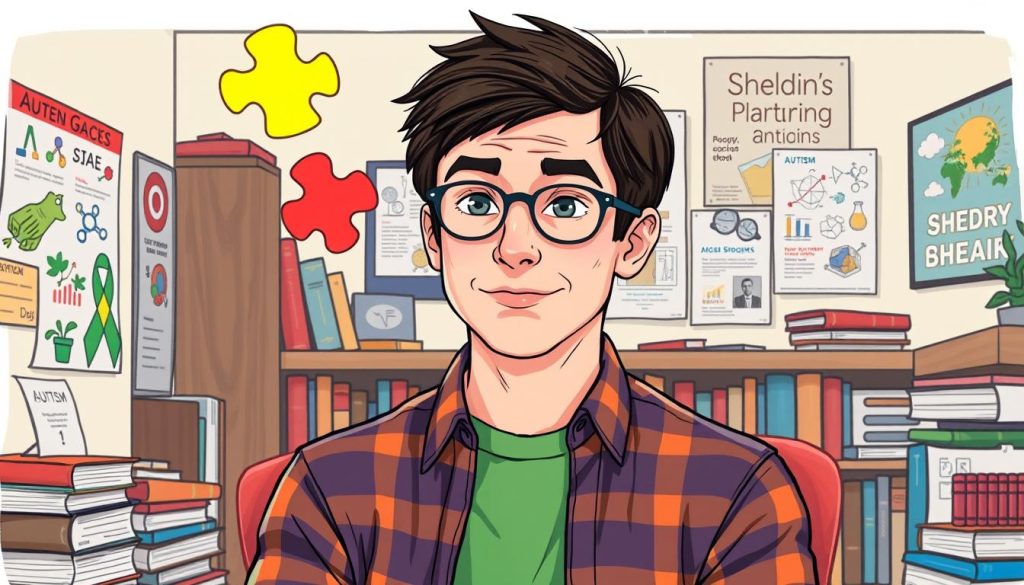
- Increased visibility of autism-like traits
- Sparked conversations about neurodivergence
- Reinforced some stereotypes about autism
- Lacked explicit confirmation of Sheldon’s diagnosis
Even though The Big Bang Theory never said Sheldon was autistic, his character opened doors for more TV diversity. This led to shows with characters openly identified as autistic.
| Aspect | Impact |
|---|---|
| Public Awareness | Increased understanding of autism-like behaviors |
| Representation | Mixed – both positive visibility and possible stereotyping |
| Conversations | Encouraged talks about neurodiversity |
| Media Influence | Inspired more diverse character portrayals in TV shows |
Creator’s Perspective on Sheldon’s Character
The creators of The Big Bang Theory have faced many questions about Sheldon Cooper. Chuck Lorre and Bill Prady, the show’s creators, have never said Sheldon has autism. They’ve always kept his diagnosis a secret.
In interviews, Lorre said they didn’t aim to show Sheldon as autistic. They wanted to make a unique character with his own quirks. This way, they could explore his personality without a medical label.
Jim Parsons, who plays Sheldon, has his own thoughts on the character. He thinks Sheldon’s behaviors come from his intelligence, not a condition. Parsons aimed to bring Sheldon to life without a specific diagnosis in mind.
The writers made Sheldon a complex and interesting character. They gave him traits like strict routines, trouble with social cues, and deep focus on certain topics. These traits make him stand out.
| Sheldon Cooper Traits | Creator’s Intent |
|---|---|
| Social awkwardness | Highlight genius-level intelligence |
| Rigid routines | Showcase unique personality |
| Literal interpretation | Create comedic situations |
| Intense interests | Emphasize dedication to science |
Fans keep debating if Sheldon Cooper has autism. But the creators say they just wanted to show a brilliant and quirky character. They believe Sheldon adds depth and humor to The Big Bang Theory.
Comparing Sheldon to Other TV Characters with Autism
Sheldon Cooper from “The Big Bang Theory” isn’t the only TV character with traits linked to autism. Let’s see how Sheldon compares to other neurodivergent characters on TV.
Similar Character Portrayals
TV shows are now featuring characters with traits of autism. For example, Chidi Anagonye from “The Good Place” has traits similar to Sheldon’s. Both are smart and have specific interests, traits often seen in autistic characters in sitcoms.
These portrayals help raise awareness about neurodivergence in media.
Representation Accuracy
“The Big Bang Theory” never says Sheldon has autism, but his traits match many autism aspects. Shows like “Atypical” and “The Good Doctor” have characters openly called autistic. These shows aim to show accurate views of autism, moving past stereotypes.
TV is changing, showing more nuanced and respectful views of autism. This change helps viewers understand and value neurodiversity. It promotes acceptance and inclusivity in our society.
FAQ
Q: Does Sheldon Cooper have autism?
A: Sheldon Cooper shows traits like those found in autism spectrum disorder (ASD). But, the Big Bang Theory creators never said he has autism. His actions suggest he might have ASD, but it’s not confirmed.
Q: What are some of Sheldon Cooper’s traits that suggest he might have autism?
A: Sheldon’s traits that might point to ASD include his trouble with social skills and strict routines. He also has a hard time understanding sarcasm and social cues. Plus, he’s very smart in certain areas.
Q: How does Sheldon’s social interaction differ from neurotypical individuals?
A: Sheldon finds social talk hard and struggles to understand social cues. He often takes things too literally and has trouble with empathy. These are common in people with ASD.
Q: Are Sheldon’s rigid routines and rituals indicative of autism?
A: Yes, Sheldon’s strict routines, like sitting in his spot on the couch, are typical of ASD. His need for a set schedule also shows this trait.
Q: Does Sheldon Cooper have savant skills?
A: Sheldon is incredibly smart in physics and math, similar to savants. But, he’s not called a savant. His exceptional abilities are sometimes linked to autism, though not all with ASD are this gifted.
Q: How does Sheldon handle change and new situations?
A: Sheldon dislikes change and finds it hard to adapt. This is common in people with ASD, who often prefer routine.
Q: What impact has Sheldon Cooper’s character had on autism awareness?
A: Sheldon has helped raise awareness about neurodivergence and ASD. His portrayal has sparked both positive and negative discussions about autism in media.
Q: How does Sheldon Cooper compare to other TV characters with autism?
A: Sheldon shares traits with other TV characters seen as autistic, like social challenges and unique behaviors. But, how well these characters represent autism varies a lot.
Q: Does Sheldon Cooper have Asperger’s syndrome?
A: Sheldon shows traits of Asperger’s syndrome, now seen as part of ASD. But, the show’s creators never said he has Asperger’s. His traits match many aspects of Asperger’s, but it’s not confirmed.













